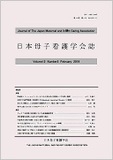Japanese
English
- 有料閲覧
- Abstract 文献概要
- 参考文献 Reference
要旨
目的
助産師外来を受診する妊婦の出産準備感と助産師のProfessional Learning Climate(以下,PLC)との関連を明らかにする。
対象と方法
平成28年2月から3月に都内一病院の助産師外来で妊婦健康診断を受ける妊娠19週から36週の妊婦を対象とした自己記入式質問紙調査を行った。調査内容は、妊婦の出産準備感(亀田他,2004)、助産師外来における助産師のPLC(亀田,2011)、属性である。分析はSpearmanの順位相関係数の算出、Mann-Whitney U検定および重回帰分析(強制投入法)を行った。
結果
平成28年2月から3月に助産師外来を受診した妊婦うち、研究協力への同意が得られた117名に調査用紙を配布し、117部(回収率100%)を回収し、年齢と職業が未記入である2部を除いた115部(有効回答率98.3%)の有効回答を得た。研究協力者の平均妊娠週数は28.81(SD6.23)週、年齢は30−34歳が41.7%であった。出産準備感の〔出産経過の情報・知識・イメージの準備〕および〔施設・医療者とのコンタクト〕尺度得点は、今回初めての出産となる妊婦が1回以上の出産を経験している妊婦より有意に低かった(U=460.5,p<.001)(U=545.0,p=.005)。出産準備感の〔出産経過の情報・知識・イメージの準備〕および〔施設・医療者とのコンタクト〕尺度得点は、助産師のPLC尺度総得点との間にrs=.186−.396(p<.05)、妊娠週数との間にrs=.338−.452(p<.001)の有意な正の相関関係が示された。妊娠週数、出産準備感の〔生活習慣と心身の健康管理〕尺度得点、助産師のPLC尺度総得点との間には有意な相関関係が示されなかった。妊婦の出産準備感3下位尺度得点を従属変数とし、助産師のPLC尺度総得点に過去の妊娠経験有無および妊娠週数を調整変数として独立変数に加えた重回帰分析(強制投入法)の結果、助産師のPLC尺度得点が高いほど、出産準備感の〔施設・医療者とのコンタクト〕尺度得点が高まる影響が示された(β=.171,p<.001,ΔR2=.246,F=13.42,p<.001)。
結論
助産師のPLCを高めることは妊婦の出産準備感の〔出産経過の情報・知識・イメージの準備〕を高める影響が示され、助産師が雰囲気や姿勢を改善することにより、妊婦と医療者の出産に関するコミュニケーションが促進されることが示唆された。このため、助産師外来を担当する助産師のPLC向上は重要であり、今後PLC向上のための支援方略の検討が必要となる。
Objective
The purpose of this study was to clarify the relationship between the readiness for childbirth of pregnant women and the Professional Learning Climate (PLC) of midwives at the midwifery clinic.
Material and Method
A self-completed questionnaire survey was conducted on pregnant women who were in the 19th to 36th week of gestation and who visited a hospital in Tokyo for a prenatal checkup from February to March 2016. The questions included the readiness for childbirth of pregnant women (Kameda, et al., 2004) and the PLC (Kameda, 2011) of midwives at the midwifery clinic. The statistical analysis was conducted using the Mann-Whitney U test, the Spearman rank-correlation coefficient and the multiple regression analysis.
Results
The questionnaires were distributed to 117 pregnant women who consented to the survey, and 117 completed questionnaires were retrieved (100%). Excluding two women who did not answer the age and occupation, the valid response was received from 115 women (98.3%). Their mean week number in pregnancy was 28.81 (SD 6.23) weeks, and the majority of the women (41.7%) was 30 - 34 years old.
As for the readiness for childbirth, the scale scores for the "Preparation for the information, knowledge and an image about childbirth process" and the "Contact with the facility and/or medical professionals" were significantly lower in nulliparas (U = 460.5, p < .001) than in multiparas (U = 545.0, p = .005). No significant difference was observed between the scale scores for the "Control of lifestyle and mental and physical health" and the total score for the "PLC of midwives".
As for the readiness for childbirth, the scale scores for the "Preparation for the information, knowledge and an image about childbirth process" and the "Contact with the facility and/or medical professionals" showed a significant positive correlation with the total score for the "PLC of midwives" (rs = .186-.396; p < .05) and the week number in pregnancy (rs = .338-.452; p < .001). No significant correlation was observed among the week number in pregnancy, the scale score for the "Control of lifestyle and mental and physical health", and the total score for the "PLC of midwives".
For the multiple regression analysis using the scale scores of the three subscales for the readiness for childbirth as the dependent variable, the total score for the "PLC of midwives", as well as the presence or absence of pregnancy experience and the week number in pregnancy as the adjustment variable, were added to the independent variable. The analysis result showed that the scale score for the "Contact with the facility and/or medical professionals" is higher in those whose scale score for the "PLC of midwives" is higher (β = .171, p < .001, ΔR2 = .246, F = 13.42, p < .001).
Conclusions
It was demonstrated that strengthening the PLC of midwives influences the enhancement of the "Preparation for the information, knowledge and an image about childbirth process" as for the readiness for childbirth of pregnant women, thus suggesting that the communication between pregnant women and the medical professionals about childbirth is promoted if midwives' atmosphere and behavior are improved. Therefore, it is important to strengthen the PLC of midwives who are in charge of the midwifery clinic, and it is also necessary to study how to support them to strengthen their PLC.
Copyright © 2019, The Japan Maternal and Infant Caring Association All rights reserved.


